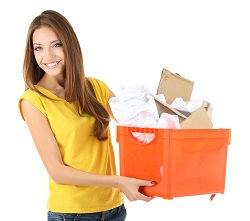Is Your Clutter Telling You Something?
Posted on 27/06/2025
Is Your Clutter Telling You Something? Understanding the Hidden Messages in Your Mess
Do you ever wonder if the piles of paper, overflowing closets, or scattered items around your home are sending you a message? Clutter isn't just about disorganization or lack of time; it can be a reflection of your inner world, your past experiences, and even your current emotional state. In this comprehensive guide, we'll dig deep into the psychology of clutter, explore why it happens, and uncover what your mess might be trying to tell you. So, is your clutter telling you something? Let's find out!

What Is Clutter? Defining the Mess
Clutter is more than just a collection of unused items or disarray. It's the accumulation of things that no longer serve a purpose or bring value to your life. Clutter can take many forms, including:
- Physical clutter: piles of paper, unfiled documents, overflowing storage spaces.
- Mental clutter: racing thoughts, unfinished tasks, worries that never end.
- Digital clutter: unread emails, endless notifications, disorganized files.
- Emotional clutter: unresolved emotions, memories you can't let go, lingering regrets.
Understanding the different types of clutter is the first step in deciphering what your mess is trying to communicate. "Is your clutter telling you something important?" The answer often lies beneath the surface.
The Psychology Behind Clutter: Why Do We Accumulate Stuff?
Clutter as a Reflection of Your Mindset
Psychologists have found strong correlations between clutter and mental health. A cluttered environment can be a manifestation of stress, anxiety, or depression. Conversely, clutter can also exacerbate these feelings, creating a vicious cycle.
- Stress and Anxiety: Messy spaces can overwhelm the senses and contribute to ongoing stress.
- Depression: People experiencing depression may lack the energy or motivation to organize, leading to clutter.
- Perfectionism: Some individuals postpone tidying up until they can do it "perfectly," resulting in accumulated messes.
So, what is your clutter telling you? It could be signaling deeper emotional or psychological issues that need attention.
Clutter as a Coping Mechanism
At times, clutter can be a way to cope with difficult experiences or emotions. Holding on to belongings may serve as a way to maintain comfort or a sense of security. Is your clutter telling you you're not ready to let go?
- Sentimental Value: Items connected to memories can be hard to part with, especially after a loss.
- Fear of Lack: Accumulating goods can stem from concerns about scarcity or poverty, common among those who experienced deprivation in the past.
- Control: Organizing or accumulating things can restore a sense of order during chaotic times.
These patterns suggest that clutter can often be a silent messenger, hinting at what's happening inside you.
What Is Your Clutter Telling You? Deciphering the Signs
1. Cluttered Workspaces: Overwhelm or Ambition?
If your desk is buried under files, books, and random supplies, your clutter might be telling you that you're feeling overwhelmed. On the flip side, it might be a sign of creative chaos, representing a mind brimming with new ideas.
- Constant stress: You may be taking on too many tasks.
- Loss of focus: Goals and priorities may not be set or followed.
- Creative motivation: Some people find their mess fuels their creative process.
2. Overflowing Closets: Sentiment or Shopping Habit?
Are your closets stuffed with clothes you never wear? This clutter could be telling you a few things:
- Emotional attachment: You connect memories or self-image to certain garments.
- Fear of waste: Letting go feels like admitting you made a mistake in purchasing.
- Identity crisis: Shopping becomes a substitute for fulfillment or self-expression.
3. Piles of Paperwork: Avoidance
Paper clutter--like unpaid bills, unopened mail, and to-do lists--often signals avoidance. Is your clutter telling you you're avoiding decisions, tasks, or responsibilities? The answer may be yes.
- Procrastination: Tough decisions get postponed.
- Perfectionism: Fear of making the wrong choice stalls actions.
- Disorganization: Systems for dealing with paperwork may be lacking.
4. General Accumulation: Fear of Letting Go
If your home is filled with things you rarely use, your mess might be telling you about a deeper struggle with letting go--or even a fear of loss or scarcity.
- Scarcity mindset: Fear that you'll need the item "someday".
- Sentimentality: Keeping things for their emotional resonance.
- Unfinished Past: Clinging to items as reminders of who you once were--or wanted to be.
How Clutter Impacts Your Life
So, what happens when you leave clutter unaddressed? Aside from making spaces harder to navigate, clutter can impact your life in more ways than you might expect.
- Mental fatigue: Too much visual chaos can exhaust and overwhelm your mind.
- Decreased productivity: It's harder to get work done in a messy environment.
- Relationship strain: Clutter can lead to tension between family members, roommates, or partners.
- Compromised health: Dust and allergens may accumulate in clutter, causing respiratory issues.
- Financial stress: Lost bills or missed deadlines from piles of paper can hurt your wallet.
Clutter Can Affect Your Mood and Wellbeing
Research has shown that a cluttered home can increase levels of cortisol, the stress hormone. Over time, living in disorganization can diminish your sense of peace, vitality, and happiness. By asking yourself, "Is my clutter telling me something I need to address?", you can start on a path toward a healthier, happier life.
Practical Steps: What to Do When You Realize Your Clutter Is Sending a Message
1. Reflect on Your Relationship with Your Clutter
Set aside time to sit with your mess and ask yourself:
- Why am I holding onto this?
- Does it bring me joy or serve a purpose?
- What feeling or memory is attached to this item?
- How does this clutter make me feel when I see it?
Sometimes, simply bringing awareness to your clutter and its emotional ties can help you break the cycle.
2. Decide What to Keep, Donate, or Discard
Use the following criteria as you evaluate your belongings:
- Love it: Keep things that make you feel happy and comfortable.
- Need it: Hold onto essentials that serve a practical purpose.
- Let it go: Donate or discard what no longer serves you.
This process is about self-discovery and creating space for what truly matters to you.
3. Address the Root Cause
If your clutter is rooted in emotional pain, financial anxiety, or other issues, consider seeking support.
- Therapy: Professional help can provide valuable insights and coping strategies.
- Books and podcasts: Many resources offer guidance on organizing and decluttering.
4. Create Sustainable Systems
A clutter-free life is built on simple, sustainable habits. Try:
- Daily tidying: Spend 5-10 minutes a day putting things back in their places.
- Weekly decluttering: Choose a different area to tackle each week.
- Set up systems: Use bins, folders, or digital tools to stay organized.
5. Practice Self-Compassion
Decluttering is an emotional process, and progress can be slow. Be gentle with yourself. Remember: your clutter doesn't define you; instead, it's a signpost guiding you toward greater wellbeing.
Decluttering as a Form of Self-Care
Many people find that once they address clutter, they experience greater clarity, peace, and purpose. That's because decluttering is more than a chore--it's a form of self-care and self-discovery.
- Increases confidence: Gaining control over your environment builds self-esteem.
- Sparks joy: Letting go of the past creates space for new experiences and happiness.
- Supports goals: A tidy space can motivate you to pursue personal and professional objectives.

Common Misconceptions: Clearing Up the Confusion About Clutter
- Myth: Clutter is always bad.
Fact: Some creative types thrive in semi-messy environments. The key is knowing what works for you. - Myth: Decluttering must be done all at once.
Fact: Lasting results come from small, consistent actions. - Myth: Clutter means you're lazy or undisciplined.
Fact: As we've explored, clutter often has emotional roots.
Final Thoughts: What Is Your Clutter Telling You?
Clutter is more than just "stuff"--it's a silent communicator offering powerful clues about your emotional state, memories, aspirations, and even fears. By listening to what your clutter is telling you, you can begin a journey of reflection, growth, and healing.
If you're ready to create a more meaningful space and life, start by asking: Is my clutter trying to tell me something? The answers just might surprise you.
Share your story: Have you discovered a hidden message in your own clutter? Leave a comment or connect with others on this journey toward a more mindful, clutter-free life.
Remember: Your clutter doesn't define you--it guides you. Let it help you create the life, space, and peace of mind you deserve!
Latest Posts
Key Strategies for Effective Skip Hire Management
Unveiling the Plastics You Should Reconsider Using
Navigating the World of Hazardous Waste: What Qualifies as Dangerous

 020 3859 5580
020 3859 5580 020 3859 5580
020 3859 5580





 House Clearance
House Clearance Rubbish Collection
Rubbish Collection House clearance in London has never been easier, as Junk Removal Services can take care of your every need. From individual house junk...
House clearance in London has never been easier, as Junk Removal Services can take care of your every need. From individual house junk... With Junk Removal Services you can be confident that you’ll receive the most professional and affordable rubbish collection service within the London...
With Junk Removal Services you can be confident that you’ll receive the most professional and affordable rubbish collection service within the London...





